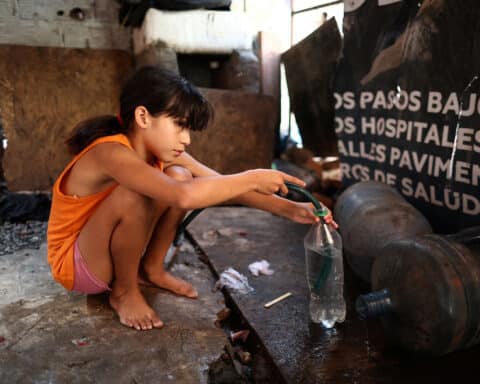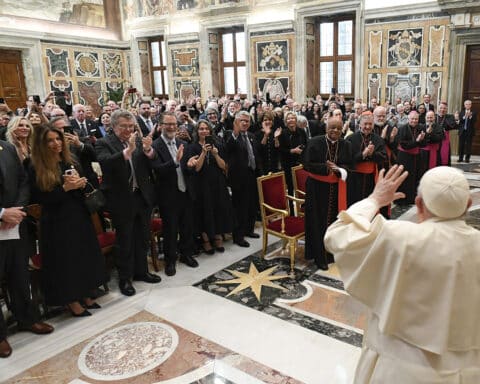
In an interview in America magazine, Father Bryan Massingale, described as a “gay Catholic priest and professor of theology and social ethics at Fordham University,” stated, “Every human being is born with this innate desire to love. For those who are oriented toward members of the same sex … to have it being described as inherently or innately sinful without any qualification, that is crushing.”
Father Massingale is partly correct. As I’ve noted in my ongoing series for Our Sunday Visitor on what it means to “be pastoral,” every human person is, indeed, born with a deep need to love and be loved. Likewise, when our attempts to be loving as we understand it are frustrated, it can be tremendously painful.
Father Massingale and other critics of the CDF announcement fail to note a second, even more critical Christian principle — namely, to be Christian is to recognize that, despite each person’s desire to love and be loved, every human person — gay, straight or otherwise — struggles to love and be loved in ways that are actually loving. Before we can claim to be Christian, we must first admit that none of us knows how to love ourselves or others in ways that enable us to experience the deep, rich, healthy, godly love for which we were created at the beginning of time. Catholics acknowledge that Christ and his Church are the only sources to which we can turn to learn to love the way we were created to love.
The entire point of Jesus’ coming was to give us a “new commandment” to love ourselves and others — not as we may naturally wish to love and be loved in our confused, broken, sinful state, but rather in the supernatural way God loves us (cf., Jn 13:34). Following Jesus, first and foremost, means being willing to undergo a complete re-formation in what it means to love and be loved. This is not just true for LGBTQ persons; it is true for every person who is a Christian.
Jesus expressly came to help us reject fallen, hurtful, human visions of “love” and to teach us how to love as the heavenly Father created us to love and be loved. Again, as I have previously noted, to love as God loves us is to:
-
- Respect the divine dignity of each person, no matter what they look like, where they come from or what they’ve done.
- Defend the life and promote the health of each person.
- Live and love in a manner that respects God’s design of our bodies.
- Actively encourage the full growth and flourishing of each person.
Much has been made in the press of the CDF’s argument that the Church cannot bless homosexual unions because the Church “cannot bless sin.” What critics fail to note is that “sin” simply means failing to love in a manner that respects the four points I listed above. The Church cannot bless any human attempt to “love” that falls short on even one of these four points. To do so would be to betray Christ’s “new commandment” to love in a new way.
This is why, in addition to LGBTQ sexual unions, the Church cannot bless such common heterosexual practices such as divorce, promiscuity, contraception, infidelity, IVF, surrogacy, masturbation, polyamory or a whole host of other things the world considers normal parts of the experience of earthly “love.” Certainly, individuals experiencing such obstacles to godly love could receive a personal blessing (for the grace to leave such practices behind), but none of these practices, themselves, could be blessed, because none of these practices reflects the four ideals to which Christian love calls us.
It is critical to note that the CDF went out of its way to both acknowledge the respect owed to LGBTQ persons and even affirm that, as individuals, LGBTQ persons are eligible to receive blessings like any other of God’s children. In fact, the document does not even suggest that homosexual persons cannot love each other; they certainly can. It simply says that it cannot bless homosexual sexual unions. That may, understandably, be a hard pill for LGBTQ Christians to swallow, but critics appear to be doing their best to increase the pain by exploitatively reframing the CDF’s announcement as an attack against the dignity of LGBTQ persons themselves. In fact, the CDF simply stated that homosexual sex falls into a wide category of activities that cannot be blessed because they do not respect the principles that lie at the heart of the Christian/Trinitarian vision of love.
Furthermore, the Church’s position on this cannot change, because the Church exists solely to promote the “new commandment” Jesus gave us to love as God created us to love and be loved. Each person is free to deny this vision of love and to chart their own course for loving, but they cannot do it and call themselves Christian. To be a Christian is, above all, to spend one’s life apprenticing in, and witnessing to, this very specific vision of what it means to love and be loved.
In discussions I’ve had recently, my progressive friends have asked me to be mindful of how much pain LGBTQ Catholics are in and how hard such statements are for them to digest. As a human being and as a pastoral counselor, I am deeply sympathetic to the pain any person — gay or straight — experiences when torn between what one believes love permits versus what Christ and his Church tell us love requires. But LGBTQ persons’ pain is not helped by anyone’s attempt to distort what the CDF said. Such distortions amount to an unconscionable attempt to exploit LGBTQ persons’ pain to advance idiosyncratic doctrinal agendas.
The truth can be hard to bear, and such pain deserves a pastoral response rooted in genuine respect, care, concern and faithful accompaniment. In this instance, at the very least, being authentically pastoral means helping LGBTQ persons deal with the pain they may feel in the face of the challenge presented by the CDF’s response. It does not mean intentionally exploiting and exacerbating their struggle to score political points.
Dr. Greg Popcak is the director of CatholicCounselors.com.





